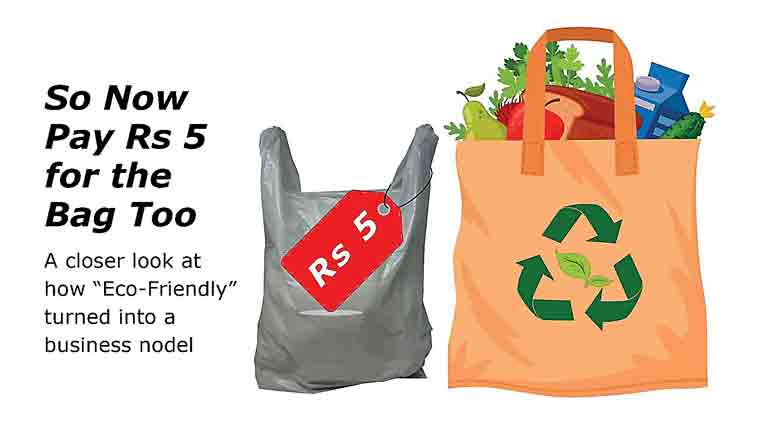Saturday Feb 21, 2026
Saturday Feb 21, 2026
Tuesday, 4 November 2025 00:15 - - {{hitsCtrl.values.hits}}

 The hidden price of going green
The hidden price of going green
True sustainability does not mean replacing plastic with materials that are costlier, heavier, or water intensive. It means re-engineering systems so the lightest, most efficient materials are captured and cycled. Reward companies that design for recycling and prove recovery rates. Expand buy back points in neighbourhoods. Support waste to value projects that turn post-consumer plastic into roads, tiles, or fuel. Publish dashboards so citizens can see what last month’s collections became. Visible feedback turns reluctant compliance into proud participationPaper straw vs. plastic straw – the cost that doublesThe paper straw is a textbook case of sentiment over sense. On a hot day, or if you sip slowly, the paper straw softens and collapses before you finish. You ask for another. The cost just doubled, and the resources did too. Two straws, two wrappers, two supply chain journeys, only to deliver a worse experience. Multiply that across cafés and cinemas, and the “eco” choice quietly becomes a resource heavy choice with a premium price tag. The plastic straw, by contrast, does its job reliably at a fraction of the cost and also with a lower carbon footprint.The vehicle accident analogyIf road accidents rise, we do not ban vehicles or charge a fee to discourage vehicles from entering the roads to reduce accidents. We improve roads, train drivers, and enforce rules. Environmental policy should follow the same logic: fix systems, not just products. Instead of innovating collection, sorting, and reuse, we ban and tax the most visible items because that makes for easy press releases. It is like blaming the driver for the potholes.Who profits from the Rs. 3-5 bag?The bag levy is often marketed as moral progress. In reality, it transfers value from consumers to retailers and suppliers unless it is transparently ring fenced for waste management. If every rupee collected funded visible, audited recycling upgrades bins, balers, buy back centres, the public would see the point and support it. Without that, the charge feels like a small, daily penalty on ordinary life.When “eco” becomes a careerAn entire industry now profits from saving the planet: consultants, lobbyists, certifiers, workshop organisers, campaign agencies. That does not make them villains. It does explain why the narrative often favours visible, premium, consumer side fixes over tougher, upstream engineering. If the planet were magically fixed tomorrow, how many eco jobs would still exist? The question itself is revealing.Plastic, paper, and the emotions of guiltThe war on plastic is also a war in the mind. Behavioural neuroscience calls it moral licensing: buy an eco-labelled product and the brain rewards you with dopamine. That is why people proudly accept a paper bag or paper straw even when the experience is worse and the total resources multiply. Eco has become a comfort product for the conscience. The feeling can be real even when the impact is small.What a better solution looks likeTrue sustainability does not mean replacing plastic with materials that are costlier, heavier, or water intensive. It means re-engineering systems so the lightest, most efficient materials are captured and cycled. Reward companies that design for recycling and prove recovery rates. Expand buy back points in neighbourhoods. Support waste to value projects that turn post-consumer plastic into roads, tiles, or fuel. Publish dashboards so citizens can see what last month’s collections became. Visible feedback turns reluctant compliance into proud participation.Start from somewhere... Start with systemsYes, we should start from somewhere. Start with systems we can scale: collection, segregation, local processing, and market incentives. Start by ring fencing the bag charge for audited recycling infrastructure, not as a quiet markup. Start by aligning convenience with conscience so the brain does not have to choose between what feels right and what fits real life.The way forwardPlastic pollution is real. Pretending that expensive alternatives fix it is wishful thinking.At this moment, there is no better, cheaper, or more practical substitute for plastic for many everyday uses.We do not fix accidents by banning cars; we fix the system around them. Likewise, we will not save the planet by banning polythene bags while selling imported glass bottles at triple the price and calling it eco. Real change will come when eco is efficient, affordable, and convenient. When it becomes the default choice rather than a luxury statement.